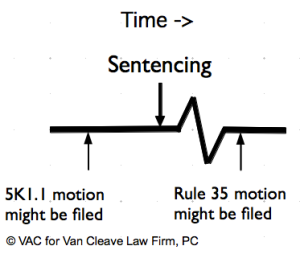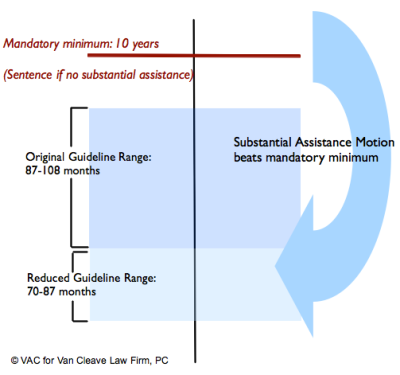There are two rules under which a sentence is commonly reduced for “substantial assistance” — Section 5K1.1 of the U.S. Sentencing Guidelines and Rule 35 of the Federal Rules of Criminal Procedure — both of which are motions that fall under 18 U.S.C. § 3553(e).
A professional federal sentence reduction attorney can use these rules to reduce a mandatory minimum sentence.
(Note: If you are using a slow Internet connection or a mobile device, you can read the condensed version of this page here.)
What is Substantial Assistance?
Basically, it is short for “substantial assistance in the investigation or prosecution of another person.” This is the goal of the defendant or inmate who cooperates with the government against co-defendants, co-conspirators, or unrelated targets of investigation or prosecution.
This typically works in one of two ways. The first is that the Government wants the cooperation of as many defendants in a case as possible. The cooperation the Government wants is the willingness of the defendants to testify against co-defendants, with the goal of either securing guilty pleas of all involved with no trial for any of the defendants (thus saving the Government substantial time and money), or else having the testimony of co-defendants at the trial, thus ensuring a guilty verdict.
The second way is that the Government wants the cooperation of a particular defendant who they believe has information that will lead to an indictment and conviction against an individual who has not yet been charged. They want this information so that they can develop the case, discover the extent of alleged illegal activity, and identify as many other witnesses and potential defendants as possible.
Section 5K1.1

Under Section 5K1.1, a defendant in a federal criminal case may cooperate with the Government before his or her sentence is imposed. It ordinarily happens in the context of a plea agreement that provides that the defendant agrees to cooperate, and the Government agrees to consider the defendant for a “5K1.1 Motion.” This motion, if made by the Government and granted by the Judge, usually results in a two-level reduction in the sentence — roughly equivalent to a 15% reduction in the length of the sentence imposed.
Rule 35
Sometimes, because the Government feels the need to make sure that the cooperation continues after sentencing, the motion for a reduction in the sentence is made after sentencing. Normally, the cooperation continues after a defendant is sentenced, and when this happens, the Government files a motion under Rule 35, and a similar (roughly 15%) reduction in the sentence occurs.
Why is this Important?
The obvious answer to this question is that the result, in either a 5K1.1 reduction or a Rule 35 reduction, is usually a two-level reduction in the sentence. But there is another benefit that is not always obvious.
Under 18 U.S.C. § 3553(e), if a sentence is reduced in accordance with either 5K1.1 or Rule 35, then the Judge is free to disregard any applicable statutory mandatory minimum sentence. What this means is that if the guideline sentence (either before or after the reduction is applied) is below the mandatory minimum, then the Judge is free to sentence at the guideline range. In contrast, without the substantial assistance reduction, the sentence would have to be at the mandatory minimum.

For example, suppose someone is charged under 21 U.S.C. § 841 (b)(1)(a) and is held responsible for a certain amount of a controlled substance. Suppose that when all the adjustments to the offense level under the guidelines are taken into account, the sentencing range is 87 to 108 months incarceration. In the case of a person who did not qualify for a sentence reduction under either of the rules discussed above (and who did not qualify for the “Safety Valve” provision), the Judge would have no choice but to sentence this person to 120 months, the mandatory minimum. However, if this person did qualify for a 5K1.1 sentence reduction for his or her cooperation, then not only would the guideline range be lowered to 70 to 87 months rather than 87 to 108 months, but also the Judge would not be bound by the statutory mandatory minimum provisions, and could then sentence the person to 70 months instead of 120 months. This difference of about four years is huge.
Similarly, suppose an individual is in the same circumstances but did not receive the 5K1.1 reduction at sentencing and received the 120 month sentence instead. If the Government filed a motion under Rule 35, then the Judge could, after sentencing, lower the sentence from 120 months all the way down to the adjusted guideline range, and reduce the sentence to 70 months.
But there’s more!
Suppose that, but for a mandatory minimum sentence, someone would otherwise be eligible for a reduction under a retroactively applied guideline amendment like the “crack amendment” or “drug minus two” amendment discussed elsewhere on my website. If a person were to receive a reduction in his or her sentence under Rule 35, not only would the Judge be able to sentence below the mandatory minimum, and not only would the person’s guideline range be dropped an additional two levels, but this person would also become eligible to have the sentence further reduced under the guideline amendment. So, for the example above, the person could actually be eligible for a sentence reduced two more levels to 57 months! Compared to the original 120 months, that is equivalent to a seven level reduction in the sentence!
Get Help from an Experienced Federal Sentence Reduction Attorney
Most of the time, the prosecutor for the Government will do what they have promised to do, namely consider the defendant for a reduction in sentence in exchange for the cooperation of the defendant. The prosecutor will file the motion, and the Judge will grant it. If this happens, all is well!
However, I am discovering more often that, for whatever reason, the prosecutor does not make good on his promise, and never files the Rule 35 motion after sentencing. This can block the way for a sentence reduction of up to seven levels. In my experience with this, I find that in some cases, the prosecutor just hasn’t gotten around to it or has forgotten.

In other cases, the prosecutor has decided, even after all the cooperation was given, that the assistance was not “substantial” enough, and just says they’re not going to file the motion to reduce the sentence. Other times, the prosecutor has made a decision not to file the motion because they don’t have all the facts they need. Usually, that happens because the case agents involved with the cooperation of the defendant have not fully briefed the prosecutor on the extent of the cooperation.
If a defendant believes that they have cooperated with the government and have “earned” their reduction, but have not received it, something needs to be done.
A federal sentence reduction attorney who has experience with Rule 35 matters needs to gather the information that should be presented to the prosecutor and either:
- “prod” the prosecutor to do what he said he would do or
- try to help the prosecutor to understand that the assistance that was provided was “substantial” and is worthy of the reduction that was earned. This takes tenacity and time.
Note that no attorney can promise or guarantee that the prosecutor will relent and file the Rule 35 motion. Beware of any attorney who makes such promises. Ultimately, it is at the prosecutor’s discretion to decide whether the cooperation provided was “substantial” and worthy of a reduction motion. Consequently, there can be no guarantee.
However, if a defendant believes they should be getting the reduction, it should be pursued, and every effort should be made to try to secure it.
______________
Free Initial Consultation
Call Now. (512) 693-9529
______________
Third-Party Cooperation
It is also possible, in certain circumstances, for the cooperation of one person to be credited to another person for Rule 35 purposes. How this often works is:
- A federal inmate has a friend or relative who is willing to cooperate with the Government in exchange for a reduction in the inmate’s sentence.
- The Government agrees to file a motion to reduce the sentence of the federal inmate in exchange for the cooperation of a friend or relative.
Basically, the friend or relative of an inmate agrees to assist in the investigation and prosecution of criminal activity of which the friend is aware in exchange for consideration of a sentence reduction for the inmate.
A professional criminal defense attorney with experience in these matters should always be involved in this process because:
- The third-party cooperator should be assured that he (or she) will not be prosecuted because of his involvement in the activity he is providing information. An attorney is the only one who can make sure that the cooperator is protected.
- An attorney is also necessary to make sure that the proper groundwork is laid for the process to work properly and to make sure that the Government is willing to give the consideration.
A special note to families. A common lament is, “It’s a shame that our loved one is away in prison, but it is good that he is away from the drugs and the destructive influences that were dragging him down.” Many with loved ones in the federal prison system also have other loved ones who are “still in the business.” They may wish that there was a way for those loved ones to get out of that destructive lifestyle without having to go to prison. Third-party cooperation may be that way.
How this helps the cooperator out of a life of crime is this: The Government agrees not to prosecute the cooperator for his or her involvement in criminal activity so long as the cooperator is completely honest about his or her involvement and agrees to provide all information about the criminal activity to law enforcement. This has the effect of “burning his bridges”, because those against whom he will be cooperating are the ones whose destructive influence is dragging him down.
Those individuals will be convicted and sentenced with the cooperator’s help, thus removing the destructive influences, and ensuring that others will not be able to trust them with criminal activity. They will also have additional accountability from law enforcement with the assurance that, so long as they continue the complete cooperation, they will not be prosecuted.
I cannot emphasize strongly enough, however, that the cooperator work closely with an experienced attorney to make sure that his or her cooperation does not result in his or her own prosecution! I am available to help with all of this.
What Does An Attorney Need to Begin?
To get started, what the attorney needs is information, such as
- What cooperation has been provided?
- Who talked to whom?
- What case agents were involved?
- What information was shared?
- What testimony was offered or given?
- What resulted from the cooperation?
- What promises or statements were made by the prosecutor and/or case agents about what the defendant would get for his or her cooperation?
What if I Don’t Have My Own Cooperator?
It may be possible that someone who has valuable information and who has an established relationship with a law enforcement agency (a paid informant) may be available. I have developed a network of cooperators over the last several years. Though this is a particularly expensive option, if nothing else is available, it may be worth considering. I can share more details with anyone who may need to know more about it.
Special Caution
With certain defendants and in certain situations, the issue of cooperation with the Government is very sensitive. There is always the possibility that retaliation against a cooperator or his or her family will occur. As such, many cooperating individuals do not wish for their cooperation to be made known to anyone, if possible. Consequently, a defendant or inmate who is cooperating or has cooperated may not wish to discuss it with family members or to receive correspondence about it because of the possibility that it may be found out and put someone at risk of harm.
If you know of someone who has openly indicated that they have cooperated and not received any benefit that they believe they were entitled to, then it may not be as sensitive for that person, and they may appreciate knowing that there may be something that can be done to help.
If you know someone for whom this information may be helpful, sometimes the best way to address it is by mentioning it on the telephone to him (or her) or as privately as possible during a visit. Then, if the defendant wishes to pursue it, he can indicate how discreet he wishes to be regarding the matter. After that, if the inmate wishes to pursue the matter, he can sometimes make a legal phone call to an attorney in the privacy of the counselor or case manager’s office.
How Much Does This Cost?
Different federal sentence reduction attorneys charge different rates for their services, and it almost always varies based on experience. I have found that a good arrangement that works for me and my clients is to bill at my rate of $425.00 per hour with a 10-hour minimum, thus $4,250.00 minimum. I have found that in most cases of this sort, everything that needs to be done is often done in around 10 to 20 hours of my time. Only in rare cases is it much less or much more.
If you would like to discuss a case with me, I would be glad to talk to you about your matter. You may email me directly or you can just pick up the phone and call me.
by Chad Van Cleave

